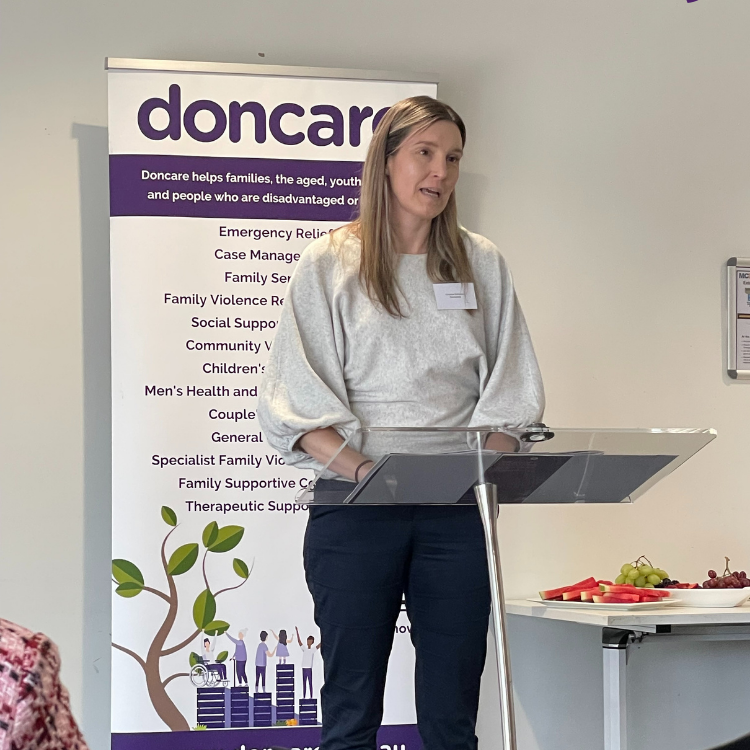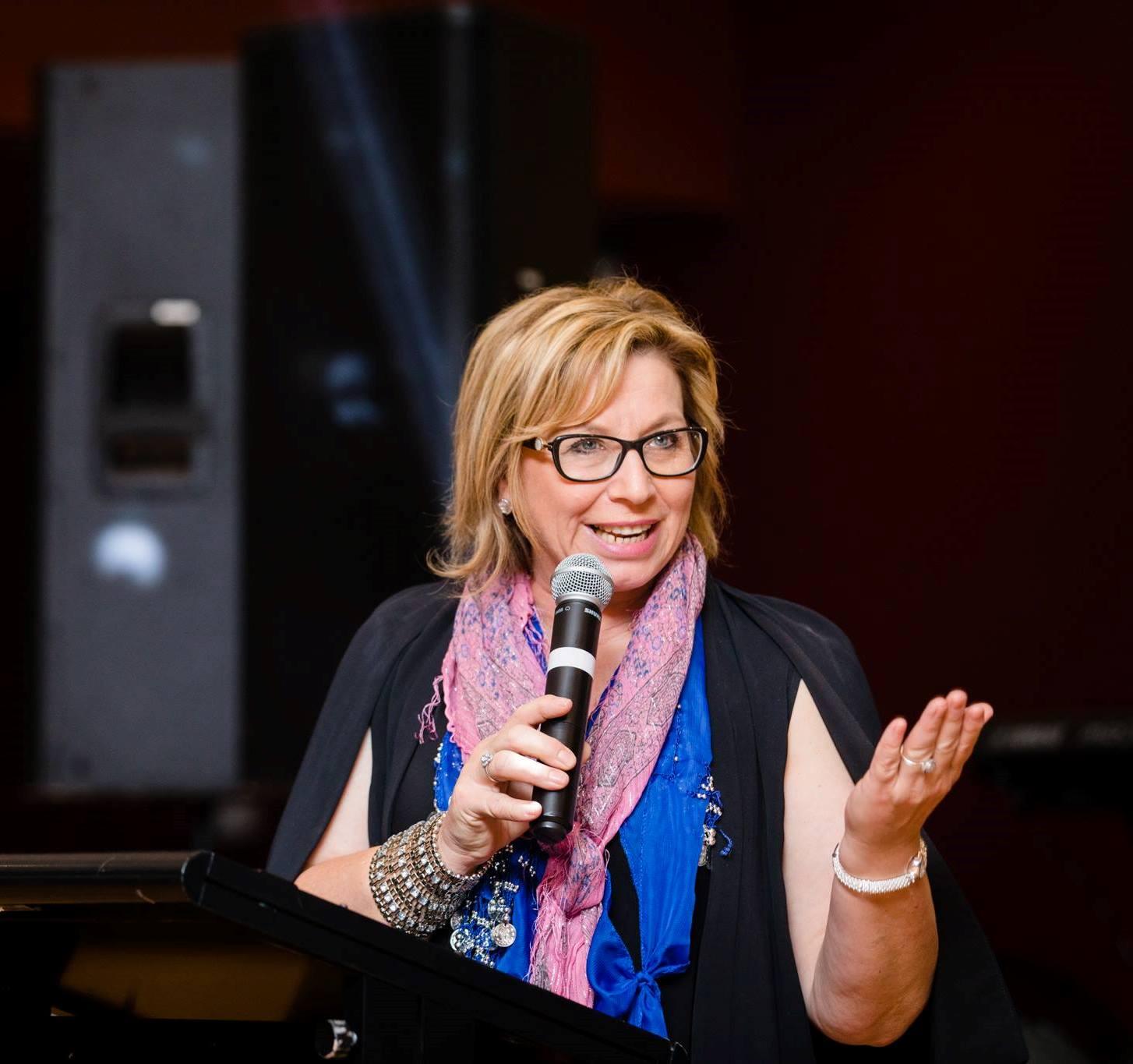
Christine Robinson emphasises importance of a recovery-focused approach to family violence
NewsChristine Robinson is the Principal Strategic Advisor with the Eastern Metropolitan Regional Family Violence Partnership. She was invited to speak at Doncare’s 55th Annual General Meeting about Victoria’s response to family violence, the intiatives informed by the experiences of women who have experienced or are experiencing family violence and her work driving local area implementation of the family violence reforms.
Christine began her presentation by recognising the strength and resilience of those who have experienced and are experiencing family violence.
It is crucial that our responses to family violence are informed by their experiences and advocacy.
I have long admired Doncare’s work, and your purpose resonates deeply with me.
“To create transformational change for our community through providing holistic, person-centred services which positively impact individual and collective health and wellbeing outcomes.”
I feel this is particularly true of the DAWN program and the outcomes it achieves for victim survivors of family violence.
My reflections as a Mentor in the DAWN program
Before I delve into the importance of the DAWN program and how essential long term recovery programs like this are to fill a significant gap in our service system, I would like to share with you my personal connection to this program. About five years ago a friend told me about this incredible program helping victim survivors of family violence through weekly connection meetings. At the time I was working as a Sergeant with Victoria Police, being part time, I felt I had the time to devote to becoming a DAWN Mentor. I had previously worked as a sexual assault and child abuse investigator, with a strong focus on family violence. It felt like a natural fit and one where I could give back to the community. I had seen firsthand the life changing effects of family violence, in particular how coercive control can diminish a person’s liberty and have devastating impacts on a person perception, personality, sense of self and self-worth, autonomy and feeling of safety and security. They can be completely socially isolated. Something as simple as going out and enjoying a cup of coffee with a friend, is an activity many women who are experiencing or have experienced family violence do not think they could ever do again.
So in late 2019 I stepped into the role as a DAWN Mentor. After my training I was matched with an amazing woman with 2 children. Not only was she on her own recovery and rebuilding journey, only just out of crisis, but she was navigating this for her children too. She had been placed in a small 1 bedroom apartment where she was not only sleeping each night with both children, but having to manage one of her children’s bed wetting, no doubt due to the trauma of the family violence they had experienced.
As we commenced our weekly catchups, either over a coffee or going for a walk around Ruffy Lake Park, I came to appreciate the breadth of services that she was having to interact with on a near daily basis. From multiple Victoria Police units, the Magistrates’ Court and Family Court, her lawyer, the specialist family violence service, housing support service, Child Protection, various GPs and specialists for both herself and her children, she was also on a wait list for therapeutic support for her children, the Royal Children’s Hospital and public dentistry. The list went on and on, and she was doing this with English as her second language, all while navigating her own trauma.
She did tell me that the time we spent together allowed her to share the intensity of her experience of the service system – her one constant was the DAWN program and our relationship. I was in the fortunate position of understanding several parts, including the intervention order and court system. I attended both the Magistrates’ Court an Family Court with her, the exhaustion of her having to attend every hearing evident. Time and again I saw the system fail this woman but the one thing that was a constant for her was the DAWN program. This program is truly something that provides someone to ‘Walk alongside’ a victim survivor of family violence for long term support, something that very few programs achieve.
My time and experience as a DAWN Mentor has stayed with me. In my role as the Principal Strategic Advisor of the Regional Family Violence Partnership, I focus on systems leadership, driving local area implementation of the family violence reforms and the multi-agency cross sector integrated service response. A key value of the RFVP is ‘recovery-oriented’. This may sound like an unusual value, but this is one that was clearly articulated as essential by our lived experience advocates. In particular, we need to strive for a service system that has a long-term recovery focus.
Recovery beyond crisis intervention
The RFVP has heard of the importance of holistic and long-term healing in multiple forums and projects, beginning with our Believed and Respected Report which informed our 2020 – 2024 strategic plan. Ten lived experience advocates were involved in the consultations that informed this report and their overwhelming message was that our systems need a broader lens in responding to family violence; one that moves beyond crisis intervention to acknowledge and address the far-reaching impacts of violence and provides the support needed for victim survivors to rebuild their lives.
Our 2023 Client Experience Project delivered a similar message; again highlighting that victim survivors need to be able to dip in and out of therapeutic and recovery care as required, assured that when they need assistance there are professionals ready to walk alongside them in their journey.
However, what we found was that despite the well acknowledged impacts of family violence, victim survivors were finding it difficult to access recovery-oriented services, both for their emotional and material needs. While some received support to rebuild their lives, others spent significant time trying to navigate services and were not always able to access the help they needed due to significant waitlists for specialist programs and strict eligibility criteria. Services which required child and adult victim survivors to be living free of violence or with minimal risk were particularly problematic as this often precluded victim survivors from receiving support they greatly needed. We also heard that many programs were only able to offer limited periods of support leading to interruptions in care for victim survivors and impeding their healing. As one participant told us: “A lot of services have a timeframe and that timeframe doesn’t always fit your healing process.”
We know too that victim survivors from culturally and linguistically diverse, and migrant and refugee backgrounds also face additional challenges in accessing the support they need to heal and recover. Language barriers were consistently raised as an issue in the Client Experience Project and noting that the eastern suburbs have a large migrant community it is essential that therapeutic recovery programs, such as DAWN, engage professionals and mentors that have the cultural understanding of these communities.
Beyond the ability to access therapeutic and recovery-oriented support, the client experience project was clear that healing occurs in the context of relationships. Helpful experiences were often contingent upon the quality of the relationship built between victim survivor and practitioner and the degree to which survivors felt heard and supported.
The recent system mapping work with our Family Violence Therapeutic Working Group, for which Doncare is a member, identified the crucial need for long term therapeutic support and case management to go hand in hand. In effect a wraparound approach by one program to assist in relieving the competing needs that make one’s recovery journey more difficult.
The importance of the DAWN program
Programs like DAWN are vital because they allow survivors to build a trusting relationship over time, one from which they can draw strength and support as they navigate a complex and challenging system. The concept of walking alongside is one that keeps being raised by those with lived experience, but we know this is not something that is consistently available to people recovering from family violence. This is the unique value of the DAWN program.
The DAWN program was highlighted as a best practice example in the Family Violence Reform Implementation Monitors 2022 report - Crisis response to recovery model for victim survivors. I commend the funding bodies who have supported this important program through their ongoing funding, and the Doncare team, including Freya and Clara who support the DAWN mentors and clients.
The time has now come for the government to recurrently fund this as a long-term therapeutic support program. Because as our therapeutic working group members noted - when therapeutic work is done with someone for 12 + months, things change.
Printed with the permission of Christine Robinson, Principal Strategic Advisor with the Eastern Metropolitan Regional Family Violence Partnership.

